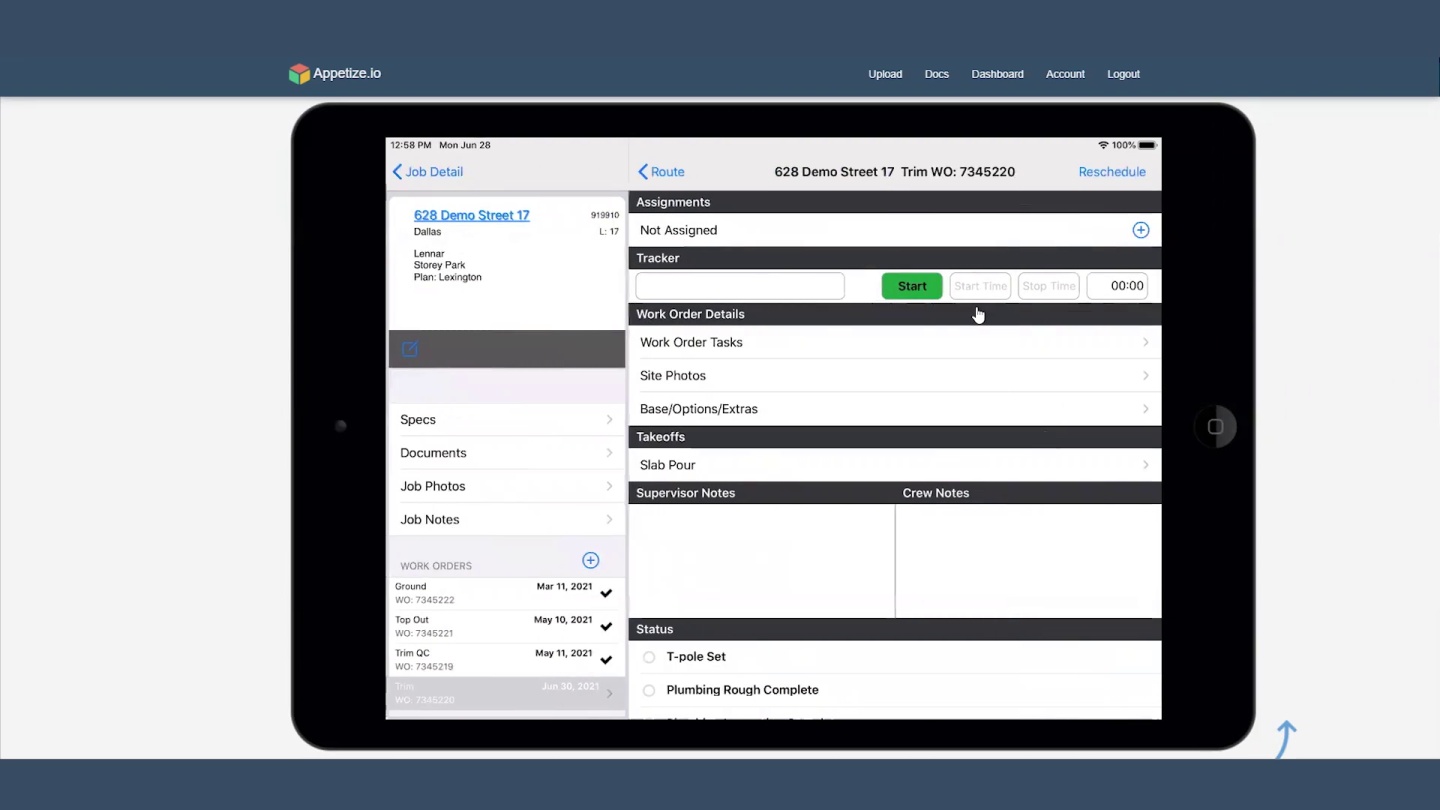Home > Blog
Read Time — 9 minutes
How To Improve Your Trade Contracting Business

Trade contractors face many daily challenges, from tight deadlines with home builders to project cost management. Adding to this is the very real labor shortage for skilled trades. Staying ahead of the curve requires innovative solutions to overcome common challenges.

Top five business challenges faced by trade contractors
Through our discussions with current and prospective customers, we have learned that trade contractors seek to better manage their business operations through automation and software rather than traditional methods like paper, whiteboards, and spreadsheets.
Builder portals
Managing multiple builder portals and juggling a flood of purchase orders can significantly challenge trade contractors in residential new construction. Each home builder typically has its portal or system for submitting and tracking purchase orders, which can lead to a fragmented and time-consuming process for trade contractors. Keeping track of orders across multiple portals becomes a logistical nightmare, often resulting in missed deadlines, overlooked orders, and inefficiencies in procurement.
To complicate the issue, the sheer volume of purchase orders inundating trade contractors further complicates matters. With numerous projects underway simultaneously, each with its orders and specifications, staying organized becomes increasingly challenging. Manually navigating multiple portals to track orders, verify details, and ensure timely fulfillment becomes daunting, consuming valuable time and resources.
Moreover, the lack of a centralized system exacerbates communication challenges between trade contractors and home builders. Without a unified platform to manage purchase orders, there's a risk of miscommunication, delays in order processing, and potential errors in project execution.
Bolt consolidates all builder portals into one centralized platform, simplifying the management of purchase orders (POs). Instead of juggling multiple portals and struggling to keep track of incoming orders, contractors can access all POs within Bolt's unified interface. This streamlines the procurement process, allowing contractors to efficiently track and manage POs without the hassle of navigating through various platforms. With Bolt, trade contractors have a single source of truth for all their projects and associated documentation, improving overall workflow efficiency.

Paper processes
Trade contractors often find themselves drowning in paperwork, grappling with numerous paper processes, and the challenge of keeping track of all job-related documentation. In the traditional construction workflow, paperwork is ubiquitous, encompassing everything from contracts and permits to project blueprints and change orders. However, manually managing this documentation can be cumbersome and time-consuming, fraught with inefficiencies and potential for errors.
Relying on paper processes leads to cluttered workspaces and increases the risk of documents being misplaced or lost altogether. This can result in delays, misunderstandings, and even disputes between contractors, subcontractors, and clients. Moreover, the sheer volume of paperwork makes it difficult for trade contractors to maintain an organized and systematic approach to documentation management.
Furthermore, the manual handling of paperwork limits accessibility and collaboration among team members. Accessing critical information becomes time-consuming with documents stored in physical files or scattered across various locations. This lack of accessibility can impede decision-making processes, hinder project progress, and ultimately affect the overall efficiency and profitability of the business.
Bolt eliminates the need for cumbersome paper processes by digitizing job-related documentation. Contractors can upload, organize, and access all documents within Bolt's platform, reducing paperwork clutter and ensuring that important information is available anytime, anywhere. By centralizing document management, Bolt enhances accessibility and collaboration among team members. Whether contracts, permits, or project blueprints, contractors can rely on Bolt to securely store and manage all job-related documentation, streamlining administrative tasks and enhancing overall productivity.
Watch Bolt simplify scheduling and project management

Schedule management
Navigating job schedules and managing ever-changing dates can be a constant uphill battle. Each project has its own set of deadlines, milestones, and scheduling intricacies, making it challenging to keep everything on track. Add to that the dynamic nature of construction projects, where schedules are subject to frequent changes and adjustments, and you have a recipe for complexity and frustration.
One of the primary challenges trade contractors face is balancing multiple projects simultaneously while ensuring that each crew is scheduled effectively. With numerous jobs in progress concurrently, coordinating manpower, equipment, and materials becomes a logistical puzzle. Trade contractors must juggle competing priorities, allocate resources efficiently, and adapt quickly to unforeseen changes in project timelines.
Moreover, the changing nature of construction schedules adds another layer of complexity to the mix. Delays, weather disruptions, client requests, and unforeseen challenges can all necessitate project timelines and scheduling adjustments. Trade contractors must stay agile and responsive, constantly monitoring schedules and communicating updates to their teams and clients.
Getting crew schedules out each day compounds the challenge, requiring meticulous planning and coordination to ensure that manpower is allocated appropriately to meet project demands. From assigning tasks and shifts to communicating schedule changes and addressing conflicts, managing crew schedules is time-consuming and labor-intensive.
The consequences of inadequate schedule management can be significant, ranging from missed deadlines and cost overruns to strained client relationships and reputational damage. In the competitive construction industry, timely project delivery is crucial for maintaining client satisfaction and securing future business opportunities.
Bolt simplifies schedule management with its dynamic and user-friendly interface. Trade contractors can easily create, update, and share schedules with their crews in real-time. Bolt's intuitive scheduling tools allow contractors to seamlessly adjust to ever-changing schedule dates. Automated notifications and reminders ensure that crew schedules are efficiently managed daily, reducing the risk of scheduling conflicts and delays. With Bolt, contractors can maintain clear communication and coordination with their teams, improving project efficiency and timeliness.

Communication with crews and home builders
Effective communication is the lifeblood of successful projects in the construction industry. Yet, trade contractors often face challenges maintaining clear and timely communication with their crews and home builders. Communication breakdowns can lead to misunderstandings, delays, and costly errors, impacting project progress and client satisfaction.
For trade contractors, ensuring seamless communication with their crews is essential for coordinating work activities, disseminating important information, and addressing on-site issues promptly. However, traditional communication methods such as phone calls, emails, and in-person meetings can be inefficient and prone to misinterpretation. Coordinating schedules, conveying project updates, and addressing concerns in real-time becomes increasingly challenging as projects scale and teams grow.
Similarly, maintaining open lines of communication with home builders is crucial for trade contractors to ensure that project requirements are understood and expectations are met. Builders rely on trade contractors to deliver high-quality artistry within specified timelines and budgets. Effective communication allows trade contractors to provide progress updates, discuss project milestones, and promptly address any issues or plan changes.
Additionally, implementing standardized communication protocols and establishing regular check-in meetings can help trade contractors maintain consistency and clarity in their communications. Clear channels for reporting issues or requesting assistance can help minimize delays and promptly address problems.
Bolt facilitates seamless communication between contractors, crews, and builders through its integrated messaging features. Contractors can send updates, share important information, and address inquiries directly within Bolt's platform, eliminating the need for time-consuming phone calls and emails. By providing a centralized communication hub, Bolt enhances collaboration and transparency across all project stakeholders. Whether it's discussing project milestones or addressing on-site issues, contractors can rely on Bolt to streamline communication workflows and foster stronger relationships with both crews and builders.

Project updates
Staying informed about project progress and gathering timely updates from the field is crucial for effective project management and decision-making. However, obtaining accurate and up-to-date information on a job-by-job basis can be challenging, especially in the fast-paced environment of construction.
One of the primary pain points trade contractors faces is the lack of visibility into ongoing activities in the field. Without real-time updates and status reports, trade contractors may struggle to track project milestones, monitor completion statuses, and identify potential issues or delays. This lack of transparency can lead to miscommunication, missed deadlines, and costly errors, ultimately impacting project outcomes and client satisfaction.
Furthermore, trade contractors often operate across multiple job sites simultaneously, making it even more challenging to gather comprehensive project updates. Coordinating with field personnel, tracking progress across different locations, and ensuring consistency in reporting become logistical hurdles that trade contractors must overcome.
Implementing standardized reporting protocols and establishing regular communication channels with field personnel can also facilitate the flow of project updates. By setting clear expectations for reporting progress, milestones, and issues, trade contractors can ensure that relevant information is communicated effectively and consistently across all job sites.
Additionally, investing in training and empowering field personnel with mobile tools and devices can enable them to provide timely updates from the field. Mobile apps and digital platforms allow field workers to input progress reports, photos, and other relevant information directly into the system, streamlining the process of gathering project updates.
Bolt provides real-time visibility into project progress and status updates, empowering contractors to stay informed about ongoing activities in the field. Through Bolt's project management feature, contractors can track project milestones, monitor completion statuses, and access detailed job information on a job-by-job basis. Comprehensive reporting and analytics tools enable contractors to gather actionable insights and make informed decisions based on accurate data. With Bolt, contractors can effectively manage their projects, mitigate risks, and drive successful outcomes by staying connected and informed throughout the construction process.

Bottom line for trade contractors
Managing multiple builder portals and coping with the influx of purchase orders poses significant hurdles for trade contractors in residential new construction. Streamlining this process is essential to enhance efficiency, reduce errors, and improve overall project management.
The burden of numerous paper processes and the challenge of managing job-related documentation weigh heavily on trade contractors. Streamlining this aspect of their operations is essential to improve efficiency, reduce errors, enhance collaboration, and minimize environmental impact. Transitioning to digital documentation solutions can revolutionize the way trade contractors manage paperwork, leading to increased productivity and profitability.
Trying to keep up with all job schedules and ever-changing schedule dates while managing crew schedules is a daunting task for trade contractors. Effective schedule management requires careful planning, clear communication, and the right tools and processes in place to adapt to evolving project dynamics. By addressing these challenges proactively, trade contractors can enhance efficiency, minimize disruptions, and drive successful project outcomes.
Effective communication is essential for trade contractors to build trust, foster collaboration, and deliver successful outcomes for their projects. By investing in robust communication strategies and leveraging technology solutions, trade contractors can overcome communication barriers and strengthen relationships with their crews and home builders.
Having access to accurate and timely project updates is essential for trade contractors to effectively manage their projects, mitigate risks, and deliver successful outcomes. By leveraging technology solutions and implementing robust reporting processes, trade contractors can overcome this pain point and improve project visibility and communication across their organization.
Bolt: Empowering Trade Contractors for Success
Click below to learn all about Bolt software features and scheduling a free personalized demonstration



